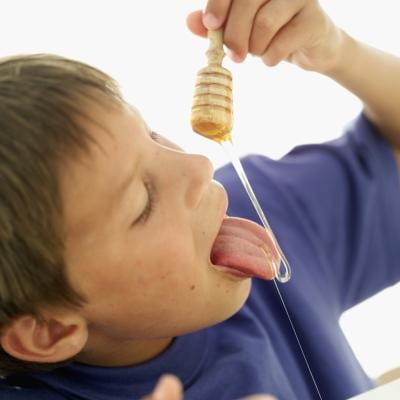Sniffling, sneezing, watery eyes and runny nose — ah, the joys of seasonal allergies. While Americans spent over $11 billion in 2005 in an effort to control allergy symptoms, some holistic and homeopathic practitioners suggest relief could be as close as the nearest beehive. Anecdotal evidence suggests that eating honey may help reduce seasonal allergy symptoms, but some dangers are associated with eating honey, according to Samuel Welch of the University of Arkansas for Medical Science.
Significance
About 36 million people in the United States, including 6 million children, suffer from seasonal allergies, according to Cobalis, a pharmaceutical company focused on allergy treatment. In addition to the cost of treatment, allergies account for about 1.5 million missed school days and 28 million days of lost productivity, according to Mark Ballow, president of the American Academy of Asthma, Allergy and Immunology. Many of those lost days are due to the side effects of allergy medications. A daily spoonful of local honey costs far less and has none of the side effects of antihistamines, if it works.
The Theory
When your body is exposed to minute amounts of something to which you are allergic, it builds up a resistance to that allergen. That’s the theory behind using honey to reduce the symptoms of hay fever, or allergic rhinitis. Bees collect local pollens to make honey, which contains some of the chemicals from those pollens. By taking a spoonful of locally produced, natural honey daily, the theory goes, you’re helping your body get used to the pollens in the air, lessening the severity of your allergy symptoms.
The Evidence
Few studies on the effects of honey on allergies exist, and those that do say it doesn’t work, according to Ask the Experts at the American Academy of Asthma, Allergies and Immunology. In a 2002 study conducted at the University of Connecticut, researchers led by T.V. Rajan found that local honey was no more effective in relieving allergy symptoms than corn syrup with artificial honey flavor.
The Dangers
While natural honey may not have the side effects associated with many allergy medications, it may still be dangerous, said Welch in an article on the University of Arkansas website. Honey may trigger a severe allergic reaction, anaphylaxis, in people who are allergic to some pollens. He also suggest that taking honey daily may sensitize you to other pollens or elements in honey. People who are allergic to ragweed and mugwort should be especially cautious about eating honey.
Warning
Do not give honey to a child under the age of 12 months. Honey may be contaminated with Clostridium bacteria, which causes infant botulism.





